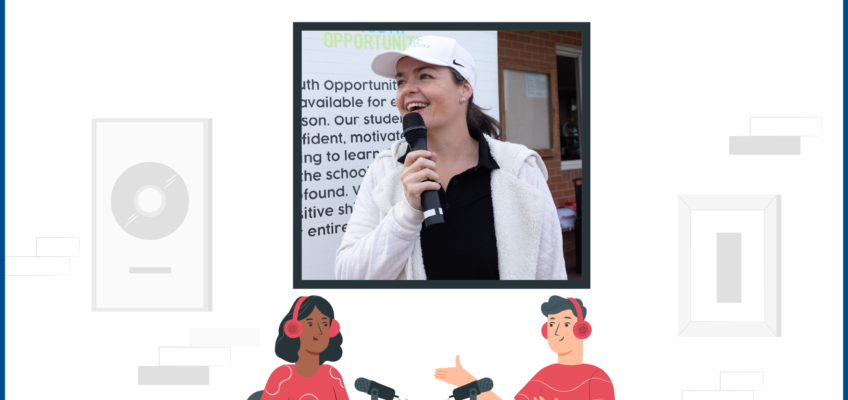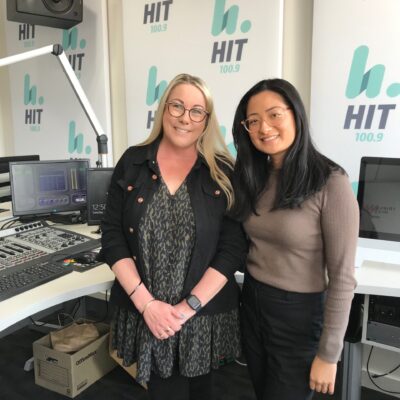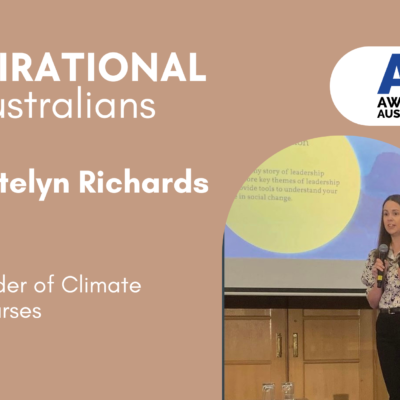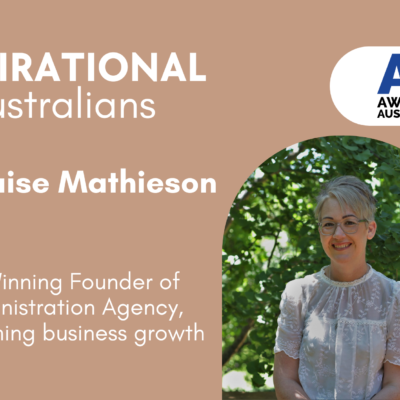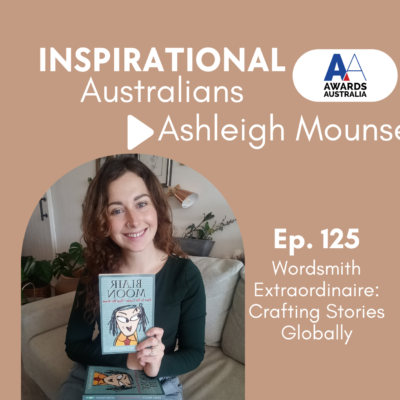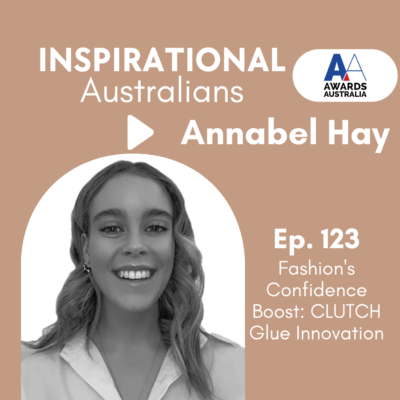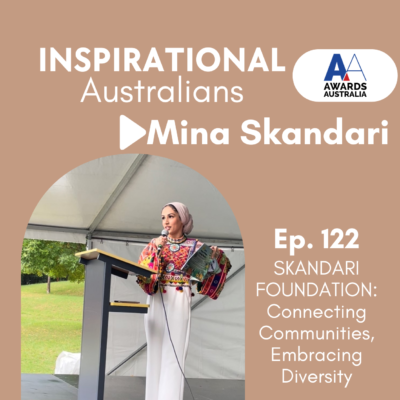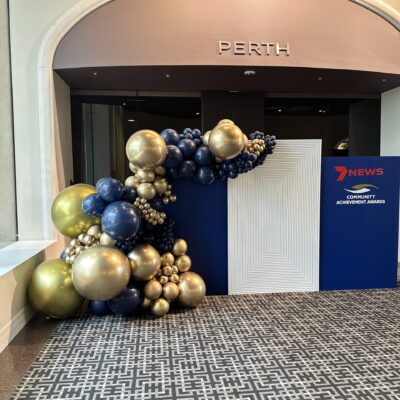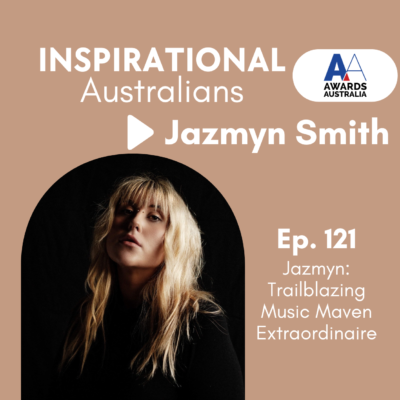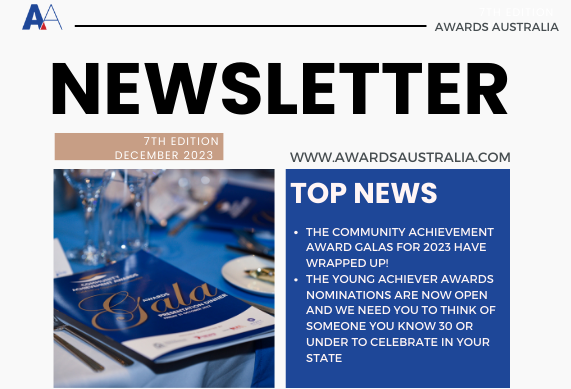Youth Opportunities has been repeatedly recognised through the Community Achievement awards as an innovator in the space of mental health and social and emotional wellbeing. Each year we engage with more than 2,000 young people from 30+ schools and organisations right across Australia. We work in partnership with schools, community organisations and individual young people to deliver wellbeing and resilience programs and a range of wrap-around services. Our young people consistently report that the programs help them develop the lifelong skills, habits and confidence to overcome challenges, strengthen relationships and build resilience.
Erin Faehrmann is the Chief Executive of Youth Opportunities. As a kid from humble beginnings and a childhood facing very complex challenges herself, she has a passion for supporting our youth to be their best no matter their circumstances.
In this episode:
• We hear all about the personal leadership programs that Youth Opportunities provides – building skills, habits and attitude of successful people. The program is one day a week for 10 weeks plus 2 years of follow-up
• Erin tells us to be proud of ourselves, even when we fail. Be proud of the growth, pick yourself up and try again
Links
Connect with Erin Faehrmann on LinkedIn
Visit the Youth Opportunities website for mor info: https://youthopportunities.com.au/
Check out Generation thrive https://generationthrive.com.au/ building a generation with the skills, habits and confidence to Thrive.
Want to know how to Rate and Review a podcast, see this article
Follow us on our Inspirational.Australians Instagram Page
Want to nominate someone? (It can take as little as 2 minutes to recognise someone making a difference)
Like some more information on Corporate Partnership?
Transcript
[00:00:04] Annette
Welcome to the inspirational Australians podcast, where we chat to people, making a difference in their communities and in the lives of others. And here is your host for today. Josh Griffin.
[00:00:21] Josh
Thank you, Annette, and look today. I do want to get right into it, but I say that I’m about to get sidetracked by quickly mentioning a few things before we introduce today’s guests. First, I want to mention that I’m recording on an Bunerong country today in the old home office and some exciting things that we’ve got happening at Awards Australia, we run the Young A chiever Awards and we’re coming in to the judging announcements. It’s one of the most exciting times because we get to celebrate so many incredible young people and share their stories. So jump on the social media. Facebook is going to start with the Instagram feed, the 7NEWS Young Achiever Awards. And you will find so many great stories. Now speaking of a great story and an inspiration to Australian today and speaking to Erin and I’m going to have to get a pronunciation check and you’re sending me one second. Erin, I’m going to give it a go. Erin Faehrmann, not bad, can be better. Erin is actually being recognized through the community achievement awards program in South Australia, a number of times actually. But recently as a finalist in our 2021 community awards air is the CEO of youth opportunities. And as I just touched on, we love talking about young people and giving a platform for them to not only find opportunities but excel in those. So it’s really cool to speak to you today. Erin, welcome.
[00:01:42] Erin
Thanks Josh.. So Lovely to be here. Niina Marni from Ghana country today. I’m in Adelaide.
[00:01:48] Josh
Lovely and Erin, how do I go in this and think I didn’t quite get it right.
[00:01:51] Erin
Oh look I go by Erin because the last name is a bit tricky. It’s famine. German heritage, so my family were originally immigrants here to South Australia back whenever way back in the day. But I actually grew up in Queensland where they definitely didn’t know how to say that name. Used to just going as Erin,
[00:02:11] Josh
you probably be around South Australia, a lot of German heritage sort of people with a German background there.
[00:02:15] Erin
Yeah, and I’m really loving the multicultural, diversity of South Australia these days, particularly the schools we work in, in, in the northern suburbs and that sort of ferry out of metro areas. It’s just some really wonderful multicultural representation. So I’m not that special anymore.
[00:02:34] Josh
Well, you know, we may as well start. You mentioned you are from living in Queensland because you haven’t always been CEO of Youth opportunities. No. What does that mean bringing you to South Australia from Queensland? Was family, was it you solo move or was it?
[00:02:50] Erin
Yeah, well, my father’s family was from South Australia and my mother’s from England originally, but her family had settled here and we were actually the outpost of the family. So I was born up in Queensland in a very small mining town. We lived in a town called sapphire, so no surprises it. Mines sapphires. Very literal naming. I Went to high School in a place called emerald. It was the gemfields. And Yeah, yeah, yeah, there’s a place called Ruby valent. So yeah, it was a very, very small community, and I’m 40 now so you know, some time ago really limited access to health services out there. I mean this is a big part of why I’m in the field. I’m in now my, my mother has had bipolar and you know, I remember her telling me as a young child that the royal flying doctor doctor service would fly into town once every couple of months and she’d go and talk to them about the challenges she was having running and we ran the town grocery store whole store, she was a widow. My father had passed away when we were all three of us, quite young to be latchkey kids from the age of eight. And she go and talk to these doctors about the challenges she was having and they’d say, oh, just have some more vodka, you’ll be right away. Like, I really hope that that is a very historical example of the types of health Care that people are receiving anywhere in the world, let alone in rural areas. And, but it is definitely something that has shaped me as a human. The tough environment that I grew up in my mum doing the best she could and it Often wasn’t good enough to keep us safe. And so when I was 15, actually I heard on the radio John laws because you don’t get any other right there in the middle of nowhere, my triple J that the high school I was going to had the worst educational outcomes in the country and at 15 I said, I’m not, I’m not doing this. Most of the girls that are a year older than me have, you know, getting pregnant no jobs in this community. I’m leaving. I’m going to Adelaide to live with our family members. I’m just getting out of here and to my mum’s credit at the time, she said we’ll all go and my sisters and my mom and so we sold the business, got rid of a house. We were homeless for a while. Couch surfing around while we were looking for somewhere, but she recognized that it was time to move on and create something better for her girls. And so that’s what brought me to Adelaide the shock of hearing how awful life was going to be. I stayed there and as I say, I have hope and optimism and I see some good stories that young people in regional areas have more opportunities and that these days.
[00:05:28] Josh
Well, yeah,that’s so interesting and full on and scary a little bit. Yes. So we thought about that story. So when he moved to Adelaide, was it a big shock? I suppose. Go ahead.
[00:05:42] Erin
Oh yeah, Josh, we thought it was the big smoke and I think I heard him one of your other podcasts. You grew up in Herald in Adelaide, say that calling out the big smoke and interesting perspective. But for us it was then we were here for two years, finished up high School and then we moved to London for a year. And that was when I realized that Adelaide is not that big, actually this much bigger out there in the world.
[00:06:07] Josh
Like a small little puff of smoke. Yeah. Yeah,
[00:06:11] Erin
exactly, it’s all relative and I think that’s what and that sense of Community that we we moved to London because my mum was having a mental health distress episode. So she was moved up there on a manic high. And we weren’t particularly safe for that year. That we were there, but by then I was 17, so I was old enough to be kicked off safe through that and make the most of that opportunity. But definitely noticed the lack of Community connection and people around you just knowing you and looking out for you, which of course, coming from a tiny country towns, everybody knew you whether you liked it or not. And then Adelaide, this is kind of for me, it’s that Lovely mid-range of it’s big enough that there’s a lot of wonderful, vibrant opportunities here. But small enough that we can have really close knit communities if we work really hard at it.
[00:07:01] Josh
So true, I feel the same bad led So as we kind of developed into your career, you know, you’re getting older, you’re back in Adelaide now. Did you always in the community kind of sector?
[00:07:17] Erin
No, this is new for me. So youth opportunities has been around for 25 years and working with high School age kids. But of course, because I didn’t go to high school here, I didn’t know about it. So I didn’t really find out about youth opportunities being a thing until I was in my mid-thirties. I was working in what do utilities and government sector and public service type areas for nearly 20 years, my first 20 years of professional career. But I’d always volunteered places to volunteer with Smith, family and the youth organisations wanting to provide as much support as I could with my discretionary time and energy and to help kids in our community. Just, you know, just wrap around them. I mean, parents can do the best they can do Often. That’s great. Sometimes it’s not. And we just, you know, it takes a village. So I’d always volunteered in lots of different ways with young people and touring kids at uni and all sorts of things. But I made a new friend, a best friend who actually is a youth graduate. She’s in her 30s now and very successful and has children back when she was 15. She was on a very different path and she did the youth opportunities program and it totally transformed her life. So she was still here actually youth opportunities. Yeah. Went off and did some things and then came in and worked here probably nine years ago. So now, and she just made me fall in love with the organisation that the program and the outcomes. And so about five years ago I joined the board as a volunteer is a bit of a side hustle. While I was working a very busy corporate job, and then a few years ago the board asked me if I’d quit my day job and my thoughts, my day job to come in is the chief executive as a succession plan for. And our chief executive at the time pay to carry the ex-footballer, who had tried a number of times to come out of retirement. This bit of a favour to the founder to run the charity. I was trying to get back into retirement, trying to find the succession plans running. Yeah, organizations like this is the tricky balance. And so, yeah, they asked me if I’d come and run the organization. I said, sure, you know, he needs money. He needs one purpose to take a pay cut and go. Yeah, run youth opportunities. So that was probably three or four years ago now. I think time flies, everything’s just pre-covid or post-covid really?
[00:09:40] Josh
Etc. Etc.. So it just quickly I’m asking about you that does seem like a pretty big decision to make, was it an easy one or was it something you really had to get the old pros and cons out in the way up?
[00:09:54] Erin
It is so easy. Yeah, it was really, really easy. Once I process the shock because I wasn’t the chairman called me in for a meeting. I thought it was about something else. And then I said, what do you reckon I Went on what I thought we were here to talk about. But it was a very easy decision. I think for myself, I grew up in really humble circumstances with very little and expected very little of the world. And I have very high what we call sense of agents, a really high locus of control. I believe quite strongly that I have the power to navigate my future no matter what comes. And so when those sorts of things pop up a jump at them and my husband and I similar backgrounds in a sense, so we make sure that we’ve made our life as flexible as possible so that if we wanted to take a year off work, we could we’d be fine, we’d be safe, we’d do what we needed to do because having grown up around so much mental, ill health in my family. But also in communities that I’ve been in, I knew that that was what mattered more than some of the other things that we can very Often get wrapped up in day-to-day. And so when I knew it was going to take my purpose box and I’d already fallen in love with the organization, how this part was leaving the place I was at because I really loved that too. I would decline myself and do them both. Yeah, it was a bit of a no brainer. It has not been an easy ride, but I’ve never regretted it.
[00:11:18] Josh
Well, that’s really cool. So I think now’s a good time to rewind and touch on what you said about your best friend who grew up and you know, maybe her life was pointing in one direction that she encountered youth opportunities. Yeah. And it’s made a huge impact. So let’s start with what, what does youth opportunities do for people at that age?
[00:11:39] Erin
Yeah, so we run personal leadership programs and so for us, a personal leader is somebody who as you know, just mentioned, this is why I fell in love is so aligned. Is someone who leads himself and so it’s somebody who really understands what their vision of success in life is. They’ve tapped into that for themselves. And they have that really strong locus of control and understand that your life can be challenging. And you can’t have everything, but it’s up to you to shape and, and make decisions every day to lead yourself forward. And that when you do that with be doing it subconsciously or consciously, you have an enormous impact on the people around you as well. One of the reasons why our program and of course we’re continually developing and improving it, but over 25 years is remain so relevant and works across ages and across cultural and diversity is because ultimately we’re asking young people, what is success to you and how do you move yourself forward, we don’t. And there’s some amazing programs like the Duke of Edinburgh awards, anything aligned to sustainable development goals. And if young people say that I want to be of service to a community or to my church, to my culture or to my family, then that’s on them if they want to serve themselves in that sense of just being the best version of themselves that they can be then that’s their version of success too. If the young person says I want to be a hairdresser, then we go, great, let’s get you there. If they say they don’t want to be one of our graduates is a Eurovision Opera. Singer person at golf. I want to go off and Eurovision OK, great. And that’s your version of success. I’m not telling you that I’m saying that it’s your job to find that and to aspire to do that. And critically it’s, the programs are a fairly intensive that 10 weeks a day, a week for 10 weeks, primarily, and then two years of follow up. So it’s not just about the initial inspiration and throwing some tools at them. It’s, it’s really focused on habit formation. And building the skills and habits and attitudes of successful personal leadership. And Often in the years I’ve been involved with youth helps a lot of that has to start at their sense of self-worth and confidence. We spend a lot of time with a lot of the young people in the early weeks of the program, just helping them believe in themselves. Seeing the light inside themselves, recognizing their strengths, using a strengths based approach for them to step outside their comfort zones. And from that they can then grow and increase that sense of agents and create that sense of confidence through what I call small acts of bravery. We scaffold them up to be brave enough to then go out and do all the things we know are critical to well-being and mental health around connection relationship and a sense of optimism because you now realize that you can’t change everything, but you actually hold a lot of power, and that’s why we can see really quick, I think ten weeks is quite quick, blink and it’s gone really, really quick improvements and sustained improvements in their well-being and their reduction of psychological distress. Risk going forward because it’s that total attitude and mind shift and a building of the base skills and habits that will lead them through whatever comes their way. Because life is tough, it happens. And even if they’re okay today, I mean the number of young people who I personally have interacted with through youth opportunities and you 10 men when they were in the program. And they were mostly focused on their career goals because life around them was pretty stable. Good family, great school. I mean how low socio schools hustle hard to support our kids. Often it’s kids not taking up the opportunities that have presented to them young people. So yeah, our schools really had to support them if the young people can take advantage of that. But it might be that in year 11 or 12, there’s a family break up, which is sadly, really, really common. And those young people then finding themselves, obviously, family breakdowns really challenging at the best of times. But now you’ve also got the logistics of living between two households. Which I mean, is anybody in your 10, 11 and 12, how they live between two houses and work out how to get part time work. You know, a lot of these kids that we work with young people a part time job. Some of them work up to three hours away. They’re trying to fit that in with their studies and exams, and then you want to throw transport between two houses into it. So it might be that you know, later in life things will come our way through challenge us, but having built skills and habits and confidence in the tools. So you’ve got that strong baseline that you can navigate them from is really critical for that sustaining part. Because we all want to just run a program in 10 weeks and then say, well good luck, I’m sure you’ll be great to work that way. So yeah, we have, we’re kind of, that’s the core of, of everything we do is personal leadership concept. There’s a 10 week program with about 350 tools in the tool kit, two years of follow up. We offer scholarships for our graduates. We’ve got online versions of our program, school, self delivered versions of our programs, so we can build capacity in community parent teacher, wraparound services so that we’re helping the adults in those young people’s lives change as well as the, the young people so that young people don’t have to do all the work and lots of lots of things we wrap around and it’s hard, it’s all about personal leadership and our four big decision framework, which is you’re making big decisions every day, whether you realize it or not. And just be really conscious of how you’re making those decisions until they become habits and then kind of fall asleep at the wheel. Yeah.
[00:17:29] Josh
Now there’s so much to love about this. Firstly, it’s so comprehensive and right to me it’s incredible that you know, you’re not putting a set of guidelines or really better words like set values and say to be successful, you need to the ABC, you’re really helping young people identify their own values. No one likes to be told what to do. Young people, I think even more so they try to figure out things for myself not be told what to do. And I think that’s super important and shows why there is that point about that long lasting impact because they believe what they’re learning because it’s important to them. So that’s a really cool win. Another term I’ve heard is kind of sparked my mind to be talking about the small acts of bravery, which I thought was really the beautiful term with this healthy risk-taking as well. It sounds like that’s kind of and it had those two things.
[00:18:21] Erin
Yeah, just that’s, that’s really similar concept. And one of the things I love about the youth opportunities approach is it’s got about 10 different psychological underpinnings. So with our research and development team sounds big, but it’s two part time people working very hard. But over 25 years, which is a fair bit of work and continuing, obviously with innovation now, which is what we were shortlisted for in the community achievement awards, staying on top of innovation. That’s really taken lots and lots of really smart research and evidence based psychological underpinnings. And synthesized and combined them into really simple symbolism. But anybody particularly young people, but really anybody can understand which again is why we can now take our program into an adult learning environment. So we work with young two young ish people now up to throw in all sorts of different industries and we work with local football clubs and steelworks and trucking companies and construction companies. And it’s really simple symbolism. So there’s things like positive psychology, which anybody listening. That’s in this world would have probably ticked off about five of them already. The psychological underpinnings, the positive psyches is a big one. And for us we have a symbolism of stars and black holes. So we talk to people about how U.S. stars and heights and black holes in your communication is at a store, or is that a black hole? If you sensed us, this is the impact it has on you and other people in terms of your self-image or your confidence about yourself. And it rubs off on other people and lots of people. Oh yeah, that makes sense because, you know, you just know those people that burst with energy and the people that don’t and the way you feel around them. And you could sit there and talk about positive psychology and the brain’s wired and all of that. But how can I remember all that what they’ll remember, the stars and black holes, and I still have graduates who are in their 30s, who say, yeah, I remember youth opportunity, stars and black holes. I still remember that and I take that with a and I’ve taught my kids and I take it to work with me and that the symbolism that really sticks with you over the long term. But at the base of it, there’s really smart evidence place and psychological theories that are coming to life in our day to day, but without people having to know that yet.
[00:20:39] Josh
So, Erin, this program is amazing. What I wanted to ask is, how would a young person at school in South Australia access this?
[00:20:48] Erin
Yeah, well, excitingly, we, we’ve made some changes in the last two years, so we can roll this out really anywhere in the world, but certainly anywhere in Australia. So when I came into youth opportunities, I’m a bit of a shock refreshing light, so I get some of the late phone calls to the office. And I remember taking a phone call about two and a half years ago from a man whose daughter was in our women’s and Children’s Hospital. She was there for recurring eating disorder, mental health challenges. And he said that the hospital have given me your number and I’m just trying to get all the support I can get for my daughter. I don’t know what to do. We’re trying everything. Can she do your program? And I said, I’m really, really sorry. At the moment we only partner with schools, so in our traditional model and it’s still our core model, we partner with school leaders, the principals governing councils, wellbeing leaders. They say to us, hey, we need you as a part of our partnership team. We need to be doing things in our school, and we also want you to come in and run your program because we really say that innovative out of the box, someone else as well as us supporting young people is a really important, important way we support that Alan is so that’s about 30 schools at the moment that we work with here in South Australia. None at the moment. Interstate. But we are working with some Interstate counterparts to find out where we could add value at the moment. And so that’s how a young person at the moment would access our program is through the vision of the school leaders. And when we work outside of the school Gates, when we’re working with businesses and other community organisations like councils, we’ve done some work with multicultural youth association organisations like that youth education centre, which is attached to the prison here. Then we’re Often working with those community ization. Similarly you say, hey, I think we could partner on something here together and as a charity. So we are a non-profit organisation. We are limited by how much we can raise to be able to deliver our programs. The young people that we work with and their families never pay. So that obviously puts a bit of a break on how far we can get when we’re working with schools, it’s really important to us that they are contributing. So they pay about a third and the other two thirds we, we rise from donations. So we have to hustle to fundraise to find people who want to invest in the future of young people and invest in our community to be able to allow that. So we’ve, at the moment we’ve got a waitlists, which is tough. We’re always on the lookout for funding that we can attract to be able to meet the demand that’s out there. We’re only in a quarter of the low socio schools here. And I, we’d love to be, at least all of them let alone all the schools in general. Having said that, outside of the school Gates, as I mentioned, if people have the means, then we have a social enterprise. Now generation thrive and it’s how same program. But it’s offered through generation thrive so you can find them generation thrive to accommodate. As I say, it’s the same program. It’s a blended online. So it’s self-paced. Moodle, one on one coaching via zoom with a personalized coach. So it replicates that and the group work type self-policing aspect as well as the one on one coaching, small acts of bravery setting that we have normally. And you can go online and you can click buy and there’s afterpay. And you can make that happen. At the moment, we’re just starting a fundraising campaign to be able to offer scholarships for young people. There’s lots of young people still that we get phone calls from saying I’d really love to access your program, but I can’t afford it. So we’re trying to fundraise off of that. So if that, if today I got the call from that gentleman at the women’s and Children’s whose daughter was struggling, I could say yes, if you can afford to pay, I can give you access for your young person. And sadly, that does happen. Most days. Somebody rings up and says, I’ve heard about your great program and an I or a young person in my life, really want that. And when we work in businesses, it is mostly more at the leadership development. And so Often they’re young or youngish. People who are doing OK, you know, spoiling cops, it already kind of semi-professional athletes and you’ve got to have good time management to be able to do that or work and have families. And so in those sorts of environments Often not always, but Often it is just about leveling up and going to the next level and building. I mean, you can never have too many enterprise skills, you can never be the best. Or you’ve achieved your targets in how you communicate your confidence, your relationship building, how you manage difficult setbacks and goal planning. And we can always all do better there. So yeah, it’s a real, a real mixed bag. And yes, we were saying before whatever people want to get out of the program, they’ll get out of it because they can customize their own goals and learnings from it.
[00:25:53] Josh
Sounds really cool. I wouldn’t do it.
[00:25:55] Erin
All right, well, I’ve done it. I just point out that I don’t mind stocks and black holes, let me at it. And yes, I do know plenty of people even into their early 30s. It does work for anybody. It’s just the team get a bit paranoid, sometimes about people in their 40s, not liking stars. I call it like there’s plenty of us who like that languageit. Yep.
[00:26:18] Josh
And so tell me about starting generation thrive as a social enterprise. Was that important to have that distinction? ? That it was obviously you thought you’ve talked about, it’s a charity and then this is a bit different.
[00:26:31] Erin
Yeah. Yeah, I think so Josh, and I come from a professional corporate background, but it was a government owned Corporation. So I kind of thought at the time, I tell people the best of both ways. Well, it really is it’s, it’s a non-profit in the sense that it’s here to provide an essential community service that’s required. But at the same time, it’s got this commercial edge of it knows, it needs to be efficient and deliver an excellent service commercially. And so I think that’s my perspective on nonprofits. In any organizations we exist to add value to the community and particularly non-profits, you know, we’re here because there’s issues in our society. I’d love to be redundant. I’d love to actually fix the system so that the issues we’re addressing didn’t exist. And perhaps I will, one day and new ones will arise and you know, we’ll keep, keep ourselves very busy adapting to the challenges in the world. But ultimately, my aspiration is that we don’t exist at all. And so that’s not happening any time soon. So as we, as I said, are getting approached by people in the world who need access to our programs. But as a charity who fundraisers to be able to provide opportunities to those facing the greatest challenges. There are people facing challenges that I couldn’t afford to support, but they were saying will pay, I’ll pay. Well, I need to find a way to let you invest if you want to invest in this, you know, Coca-Cola, I say, sorry, you’ve got too much money. Don’t come by Coca-Cola doesn’t come by Coca-Cola. Who am I to say that this isn’t going to add value to them? I need to offer it. But we also as a charity, we need to as a non-profit, that’s here for the people who need it most. We need to make sure that still at our heart, it’s our highest priority. That when we are working with young people facing significant challenges, that money’s not a barrier in that sense. You know, you do everything you need to do to support that young person. And from the outside in a commercial sense that can look like over servicing. You’ve given them too much support. You’ve talked to their parents for too long. You’ve been in there with the school working on a mental health plan with them for too long. We can’t afford that. And that is not a world that we wanted to go into. We wanted to make sure that if we were working with young people facing challenges through our nonprofit, these opportunities work that we always go above and beyond to get the outcomes, we need to fix the wicked social issues that we were here to address. And over here and generation thrive, doing an excellent excellent program with amazing outcomes, wonderful value, and you come back for it. I don’t need to fundraise for that. And hopefully, a slight kickback in terms of that becomes one day as the fundraising aspect as well in terms of supporting more young people through the program.
[00:29:25] Josh
Yeah, and it’s a brilliant distinction between the two. And it’s really important, I think, to have those both because as you said already, you’ve been serving a different community, a different cohort of people with different needs. And again, I think you summed it up really, really well. I personally love social enterprise business model. I think it’s fantastic because you don’t, as you mentioned another couple of times just a few limitations on what nonprofit can do and social enterprise sometimes doesn’t have that. You can maybe even create more impact. Whereas if we can maybe have more impact on one person can change one life more so whereas a social enterprise might be to have small touches of multiple lives. So there’s such good benefits of both models. And I think it’s really smart the way that he puts it there and done
[00:30:13] Erin
that. Well, thank you. Josh.. Yeah, well, I certainly leaned on a lot of our friends around Australia who have been down this road. I do a lot of networking industry. I’m part of a national collaborative together for youth, there’s about 15 non-profit and profit. Now organizations who work in the social emotional learning skills with high School aged students. And some of those have social enterprises, some have tried, it didn’t work, some tried, it was successful. And yet we really lean on each other heavily to share as much knowledge as we can because we’re working in the same sector with the same aspiration to just help kids thrive. And we know that communities are best placed to do that. So building capacity and community is a real focus. And so yeah, we just shamelessly share knowledge and tips and templates and lessons learnt and war stories. And so I am definitely riding the back of those. I want wonderful people who’ve gone before me as well.
[00:31:16] Josh
You have to share the waterways because they
[00:31:19] Erin
they teach you so much, don’t they?
[00:31:21] Josh
Yeah, they good. One of the thing you mentioned that was very interesting and a little bit the mind blowing emoji. And even though it’s a, you know, I think it’s, I agree with the concept wholeheartedly is about not the profits should have that mindset or charities of. Well, the end goal is to fulfill our need to achieve our mission. You know, sometimes somewhat tied to that utopian, but I think it’s if we had more of that mindset, I think it would be really beneficial.
[00:31:53] Erin
Yeah, and as you say, maybe maybe people can’t connect with it because it’s too unrealistic. Maybe like, well, that’s a stupid thing. To aim for, why would you bother? And that’s the beauty of having visions and missions. You have a vision one day, you will and that’s OK. But then you have a really tactical mission about really today. What are we here to do today? And for the next five years, what’s the difference we’re going to make in the world? But we’re really fortunate here in South Australia. I mean, you know, we had Don Dunstan and his pink shorts and we’ve been innovating in the social space long before I came along here in South Australia. So we’ve got some amazing organisational centres, the Australian centre for social innovation. We’ve got the face full of foundation here, the Wyatt trust, amazing organisations who I got to grow up around and learn that ethos from that is more embedded philanthropy, it’s about system change, sustainable system, change. It’s about communities having the resilience and the capacity to look after themselves and, and thrive themselves and say it’s not about us. And I think because I grew up in government as well. It was the same. They always, always made sure that you know, if you, if you needed to bow out that the world could go on without you, it needs to be able to go on without you. So yeah, I think and as you say, maybe it’s a little hard for people to connect with it because it’s just a bit too far out there. But what I would like to hold in my heart.
[00:33:20] Josh
Yeah, I think it is. Yeah, it’s a challenging concept. But once you think about it, you realise it’s absolutely true and I wouldn’t be a big one would aim to change the world. Hmm.
[00:33:32] Erin
Yeah. Right. Why wouldn’t you
[00:33:35] Josh
You, are you kind of touched on a term about social and emotional well-being, and that’s exactly, you know, and you also know that you’re in innovation that area and it’s exactly the category that you were a finalist of the breakthrough mental health research foundation which is another I would say very innovative, not for profit. And there the innovation of mental health, social and emotional wellbeing award. What was it like to be selected as a finalist in that award? Was I’m sure it was great. I guess acknowledgment of your work and what did it mean for the team as well?
[00:34:10] Erin
Yeah, it meant an enormous amount to the team. I think it’s a bit of a South Australian thing in general, but also a small charity like ours, just been humbly going about its business for 25 years, doing phenomenal things. Not shouting it from the rooftops, because you don’t have the money to be too busy doing the work. You literally have time to be spending time and money on telling people about it other than to try and mobilise some philanthropy. But babe, just because you don’t do it for the accolades, but to be able to say to our team, wow, You know it because you’re out there every day changing lives, helping young people change their own lives. You know that. But somebody else has looked at it and is telling us that we’re staying innovative and as an organization, that’s this year’s our 25th year as well. That’s not super new and to tell an organization that’s 25 years old, that it’s still innovative today. And that you haven’t just done something the same thing for 25 years, that you’re still keeping up, particularly in the youth space where their lives are changing every six months. Just massive cycles of change for young people in our community at the moment. And it’s really validating it helps us just really focus on what we’re doing and tell ourselves that we’re going the right way. And it gives assurance to our funders. Yes. A lot of funders that invest with us. We’re not a high profile, well known organization like some of our allies, like variety and other organizations like that that people give to us because they know that we’re really smart. We really sustained outcomes. And so for them, it’s like, yeah, yeah, they go, somebody else agreed with me that may who’s been donating to youth opportunities because I see and I believe in it. And yeah, I think so too. OK, good. That’s a, I’ll keep on that path and I’ll tell my friends about it and I’ll tell them that kids are doing it tough and that they need support as well. And so yeah, it’s a really a really Lovely thing to do, and it’s very validating for our young people too because we, we spend a lot of time talking to them about not thinking, ask, don’t thank us for the work. You’ve done the work. You stepped outside the comfort zone, you changed your attitude, you’ve built new habits, you’ve developed the confidence you’ve had to do the work. So we’re on the innovative in getting outcomes because you’re putting it in. Yes, we just happened to be here.
[00:36:43] Josh
It speaks to what you said, that’s the whole purpose of it, is that helping them with their self-worth and in it can be hardest thing sometimes for people to say is that Yes, I’ve done a good job saying it out loud like people are uncomfortable with it. It’s just should be normal.
[00:37:00] Erin
Yeah, we should be proud of ourselves. Yeah. Even when we fail, should be proud of the growth that we tried and that we were brave and that we’ll pick ourselves up and learn from it and try again. Yeah, yeah.
[00:37:14] Josh
Well, that’s a how many people just got a couple of questions. I want to ask you quickly. The
[00:37:20] Erin
buzzer around,
[00:37:21] Josh
how many people an apology? If you did mention this, I didn’t hear it earlier. How many young people do you think would go through the youth opportunities program in a year?
[00:37:30] Erin
Yes, it’s about 2000 young people that we work with. Out of that there’s about another 800 or so graduates, so brand new graduates of that program and about 2500 or so young people who are in those post years. So usually in year 11 or 12. Some of them also beyond their secondary education off to wherever tertiary or further education, or even in jobs, the mostly new graduates and the two years engagement at a hundred couple of hundred or so adults who might be parents, teachers, caregivers, lately. We also have worked out how to really meaningfully bring in quite large teams of interns, youth working social work interns into our business. So we’ve got about six each semester at the moment. I think three of them in different little bubbles of our office today on their placement, having really meaningful placements where they are out interacting at the moment on zoom. But in a few weeks, hopefully out face to face with young people delivering really strong evidence based content. But again, because of the symbolism in our program, you can actually see things. You’ve got the psychological underpinning. You could pick it up and deliver it really quickly. And you know, they’ll be doing one on one interviewing and mandatory report management with many of these young people, which is phenomenal for them. So yes, probably another 10 or 20 interns each year that we’re building their future generation of amazing social and youth workers out there, which is really great. So yeah, couple of thousand. And so about over the 25 years we’re up to around fifteen thousand or so graduates of our program and will around the world. Now we’ve got multi generational graduates now. So we’ve had, particularly last year we had a couple of parents stand up at graduations and say, oh, I did this program when I was in high school. Now I’m really excited that my son, my daughter, is doing it. So that’s really rewarding to see some of the schools we’ve been in since day one. Been there for 25 years with part of the furniture now. So yeah, it’s really, it’s like to say,
[00:39:37] Josh
it’s incredible, isn’t it to have this generation of that?
[00:39:41] Erin
Yeah. Yeah. And then really large, culturally diverse families too. We’ve got a couple of schools here that are very heavily, culturally diverse. It’s really, really common that you have young people with their family at a graduation. It’d be cousins and older brothers and sisters. And maybe even answer uncles to kind of not far off in age, and they’ll easily be seven in a family group who’ve done this upcycle cousins and sisters and brothers. And those kids in some of those schools, those young people from the day they start in that high School, they’re waiting to do, you know, they just devastated if they don’t get in because again, unfortunately we’re limited by funding. So in some of these schools we do have fairly long white lists of young people who apply to do the program and, and get them to be able to get to do the program that all the people that they really admire in their family got to do and shaped them as young people. It makes a really big difference to them.
[00:40:39] Josh
And so what’s this time of year like for, you know, for you, the workers at youth shops and also the students, you know, we’re just starting the school year. Will students launch into it early in the year or later?
[00:40:54] Erin
Yeah, it’s a great question. So particularly our school based model is really, again in partnership with schools they, we work with them to find out when in the years, right for their students. So in some of the really large schools where they’re every term and there’s 18 generally programs of young people at a time. There’s 18 young people graduating every school term in some of the smaller schools, particularly the regional schools like out in Tampa Bay. They’ve got like 14 kids in the school That’ll do it. And year in 13. Yeah, it’s about do one big program and 10 three. And they’re done. Our online program that we run in a number of schools. So run it as a subject line over a semester. And the teachers will run it themselves as part of their curriculum, so we support them to do that, but they kind of run that whenever they want to run as part of the personal lending plan subject. So yeah, it’s really, again, it’sa community based approach. We’ve got a program, we can run that lots of different ways or we could teach you to run it. You tell us when it fits because you’ve got enough to worry about as the school. Yeah. Is there enough?
[00:41:56] Josh
Is tell it like it makes so much sense what it does. I think It’s a lot of work. Yeah. A program. Yeah. How’s it going with permits? We would say Here’s our program. You do it now? Yeah. And you do it like this. So this is quite innovative, it’s very
[00:42:12] Erin
pretty. Oh, well, thank you. I think he put what matters most at the start and you work really hard to get there. And what matters to us is that the kids and the school communities get the value out of it. And when you come at it from that, it means that you might not do as many programs because you might be busy working with the school. And it’s not a particularly scalable model. That’s something that requires a lot of relationship management with schools. And that might mean that you run one less across the years, but it’s, you know, it’s what matters. It’s what gets the most assists, we’ve worked out after twenty five years. It’s what gets the most sustained local impact for individuals and their communities. So what we do
[00:42:51] Josh
well, certainly incredibly inspirational. What you do and what youth opportunities does. But I do want to ask you, Erin, who or what is it that inspires you personally?
[00:43:04] Erin
Oh man kids, I love Hank and I say kids because I also hang out with a lot of little little kids. I just love young people even when they’re really down in the dumps or they’re struggling with really significant mental health distress. And there unfortunately is a lot of that these days, you know, we know that death by suicide is the leading cause of death for young people. We know that one in four young people will develop a diagnosed mental health disorder in their, you know, by the time they’re 24 in their early years. And, but there’s something playful and optimistic about kids in amongst even all of that. That just inspires me because it’s the potential they have these moments of being super sparkly and not knowing the boundaries in the world and not knowing what you are and aren’t supposed to do. And that’s just really, really magical to be around. One of my favorite books is being better grown and becoming better grown ups. And it’s how do we, as adults in the world become better at grown ups? And a lot of it is like the favorite line that Josh Montague has written in the book is about having a sense of childlike wonder not being childish as an adult, but having a sense of childlike wonder in the world. What is possible? What is out there? What, how could this be different? As you know, kids have that naturally because they haven’t learned everything yet. And then we get older and we haven’t learned anything everything either, but we sort of forget that. I think we have I just love hanging out with kids.
[00:44:40] Josh
Yeah. And it’s like that childlike wonder it saying something or learning something new for the first time. And sometimes we forget, we’ve seen it 100000 times. And if you can, to somehow put that lens on of this is incredible like this. Yeah, you can be inspired by simple things and I’ve got one little mini anecdote that just really what you said. It reminded me of this was camping recently with some friends and some different families with kids of different ages and no kids or whatever. But 10 year old boy is the oldest of the kids and he’s basically the babysitter. It was a great playing with kids and but is at an age and he’s quite immature, a 10 year old with he actually really enjoyed talking to the adults and we’re having great conversations with him. There’s one moment he just finished playing with all the kids and I think we’re about to have lunch and he sits next to me and says kids these days And it was so beautiful and it was like kind of what you said like that kid like one the child like wondering that you can be inspired by kids. And I just thought this kid can tap into his energy and his mindset, you know, is a really wonderful thing. Yeah.
[00:45:59] Erin
And help him be his best self. I guess. I love being the adult in kids lives that backs them and helps them fly and Cheerleaders for them. And you know, I tell them where they’re stepping wrong as well how, you know, it’s not all Rah, Rah, they’ve got to know a set of communication and boundaries and the impact that having on other people. Which again, is why, you know, stuff we do here. So smart in terms of walking that line and, and being optimistic and happy but not happy every day. It’s not about moods, it’s about an enduring sense of happiness. And so to be able to be that person or just laugh at his joke, I can’t just yeah, right. That was funny. Good on. Yeah, I see you looking after the kids and you’re right. Hey, it’s just being that old adult for them to light me up.
[00:46:47] Josh
Now, one very important question is, where can people connect with you find out more about you and you?
[00:46:54] Erin
Oh yeah, well you can find me on LinkedIn. I hang out there, the spelling of my last name, I guess will be in the show notes somewhere. I guess that youth opportunities don’t come to AEW is our website. If you see big blue and green star face you found this star is very important to us in our program, positive communication. So we are always looking for people who want to invest in young people, whether that’s through their time treasure, talent, or their tribe will take networks. Cheerleaders, funding, obviously, opportunities for our kids, through youth opportunities. And I mentioned our social enterprise generation thrive to accommodate AEW. So that’s for anybody, anywhere in the world that wants to access our programs for themselves or young and young people in their world and their businesses. And I know plenty of people who’ve put that opportunity in front of their kids. My step kids did say, oh, we can finally get you to do the program. And yes, I have a look either of those websites.
[00:47:58] Josh
That’s fantastic. And I hope everyone does check it out because it is, it’s a wonderful program and definitely connect there. And that’s a very good follow on LinkedIn. So
[00:48:06] Erin
thanks Josh. today,
[00:48:08] Josh
Just type Erin and ethos in and you’ll pop up anyway! Well, yeah, thanks so much for your time today. I really enjoyed this chat and look forward to following what youth opportunity is doing this year. And beyond that, I’m sure we’ll be taking over the world.
[00:48:28] Erin
Thank you.
[00:48:29] Josh
I hope you enjoyed that interview. If you liked it or any of our other episodes, it would be great if you can write and review the Inspirational Australian’s podcast. It really helps us out if someone you know, needs a little dose of inspiration. Why not let them know about this podcast? And if you haven’t already, make sure you subscribe. So that you won’t miss an episode. Join us each week as we talk with ordinary Australians, achieving extraordinary things. You can always head to our website at awards, Australia dot com slash podcast for more information and details on each guest. Now before we go, I’d like to thank Annette our producer. Here’s a fun fact. Annette is my mum and our other host, Jeff is my dad. This podcast is brought to you by awards, Australia, a family owned business that proudly uncovers the stories of people who make a difference for others. We can only do this with the support of our corporate and not for profit partners as they make our awards programs possible. So do you know someone making a difference? If you’d like to recommend someone to be a guest on the podcast, get in touch through our Instagram page, inspirational Australians, or maybe your business might like to sponsor the podcast or get involved with the awards. We run hidta website awards, Australia dot com for more details until next week. Stay safe and remember together we make a difference.
[00:49:56] Annette
Thanks for joining us today on inspirational Australians podcast. We hope you enjoyed listening and have been inspired by ordinary Australians achieving extraordinary things. So it’s goodbye for another week. Remember together we make a difference.


